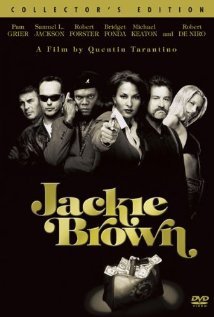“B-Movie Stands for Boring”

| None | Light | Moderate | Heavy | |
|---|---|---|---|---|
| Language | ||||
| Violence | ||||
| Sex | ||||
| Nudity |
What You Need To Know:
This linear and human story lacks heart. Some may appreciate some of the dialogue and pop cultural references in this movie, but the blaxploitation references may be lost on younger audience members. While PULP FICTION shocked audiences at every scene, JACKIE BROWN remains largely un-involving and stale until the money heist. JACKIE BROWN is mundane and highly immoral with many obscenities, drug use, illicit sex, and some violence.
Content:
(Pa, LLL, VV, S, N, A, DD, M) Pagan worldview of corrupt criminals; 48 obscenities, 26 profanities & many racial slurs; moderate violence including four shooting murders seen from afar; one brief depicted scene of fornication & sexually suggestive dialogue; upper male nudity & women in bikinis; alcohol use; smoking & frequent drug use; and, lying, cheating, stealing.
More Detail:
1970’s B-movie star, Pam Grier, plays the title character, a 44-year-old stewardess. She is caught smuggling cash into the country from Mexico for her partner, the crooked illegal arms dealer, Ordell (played by Samuel L. Jackson.) Doing the busting is FBI agent, Ray Nicolette, played by Michael Keaton. Although she’s supposed to be jailed until her hearing, she is released on bail by Ordell, who goes through bail bondsman, Max Cherry (Robert Forster). Nevertheless, Jackie doesn’t want to be a pawn of Ordell, who eliminates former partners by shooting them, so she sets up a sting operation where she can abscond with a half-a million dollars intended for Ordell.
Rounding out the cast are Robert DeNiro as a dim and trigger-happy ex-con, Louis Gara, who helps Ordell, and Ordell’s live-in girlfriend, Melanie (Bridget Fonda), who has an affair with Louis. Through careful acting, Jackie convinces all the players involved that she is allied to them, until the day of the pick-up, where her ultimate allegiance is revealed. Jackie and Max develop a romance, people are shot and killed, and the most heinous characters in the movie get their just desserts.
Filmmakers and artists who create a landmark film or product often have a difficult time following up. Mounting pressures take their toll. Tarantino states, “I knew I didn’t want bigger than PULP, so I went underneath it.” Yet, only knowing shock value and non-chronological editing, as seen in PULP FICTION, this mainly linear and human story lacks a heart. Jackson provides some energy as Ordell, but Grier and Forster are bland. De Niro’s talents are wasted in a slim role, as are Keaton’s and Fonda’s. Tarantino fans will appreciate some of the dialogue and pop cultural references in this movie, but some of the blaxploitation references may be lost on younger audience members. While PULP FICTION shocked at every scene, JACKIE BROWN remains largely un-involving and stale until the money heist. At this point, Tarantino repeats the scene from the point of view of three different characters, creating a textured and entertaining effect. Yet, afterwards, the ultimate conclusion remains largely un-satisfying because the audience didn’t gain any sympathy for Jackie.
Moral Americans who couldn’t stomach PULP FICTION will be spared some of the most heinous acts of that film, but JACKIE BROWN still has plenty of offensive material. Ordell frequently uses obscenities and racial slurs. Melanie reclines, smokes a lot of marijuana and quickly invites Louis to fornicate with her. At the start of the movie, Ordell watches a video entitled “Chicks Who Love Guns” featuring bikini-clad women who talk about their favorite weapons. Finally, Tarantino’s trademark brutality is tamed down a bit with only four murders, but they are primarily seen from far away. The first murder shown is several hundred feet away from the camera lens.
Nevertheless, JACKIE BROWN will probably be considered one of Tarantino’s least influential and least profitable films. It is getting little buzz from the press, and audience members at the screening were scratching their heads in confusion, wondering what they just saw. Perhaps, the demise of this movie may deflate the public’s enormous idolization of Tarantino and influence Hollywood wannabes and fans to appreciate movies that don’t dehumanize the audience through excessive violence, obscenities and depravity. Another Elmore Leonard adaptation, GET SHORTY, had heart and humor. Unfortunately, JACKIE BROWN has little of both.


 - Content:
- Content: 

